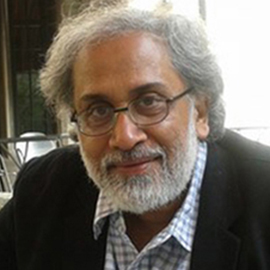Grant Recipient
SHRUJANA NIRANJANI SHRIDHAR
Title of the Project
ARCHITECTS OF A LITERARY REVOLUTION: UNPACKING THE CONNECTIONS AND AESTHETIC OF THE DALIT PANTHER AND LITTLE MAGAZINE MOVEMENTS
Shrujana Niranjani Shridhar’s project Architects of a Literary Revolution: Unpacking the Connections and Aesthetic of the Dalit Panther and Little Magazine Movements proposes to research and document the intersection between the little magazine movement (1960s–70s) in Maharashtra, and the Dalit Panther movement (1970s–80s) in the same region. This research stems from Shridhar’s work with the Dalit Panther Archive, an independent collective she co-founded in 2016, to document the vibrant history, politics, art and literature of the Ambedkarite movement in Maharashtra in the 1970s, with a specific focus on the Dalit Panthers. The work of the Dalit Panthers brings together aesthetic and political intent and, though widely recognised as a landmark in radical aesthetics, has been poorly researched and documented. With this grant, Shridhar aims to explore a key intervention into the little magazine movement in Maharashtra—one that saw major political interventions alongside experiments with literary and visual form. These experiments have manifested in diverse print modes including booklets, pamphlets, postcards, inland letters, and posters.
The jury was impressed with Shridhar’s ongoing research initiative to build an archive of the Dalit Panthers, and her framing of the Panthers as not just an organisation but a movement that had significant ramifications for political life in contemporary India. She demonstrated an astute understanding of the visual and political vocabulary of the Panthers, which will enable her to trace the specifics of their engagement with the little magazine movement in Maharashtra, as well as unpack the experimental aesthetics of their printed materials, and the pivotal role these aesthetics played in the emergence of a counter-public alongside the production of alternative visual and political sensibilities. Shridhar sees continued traces of such aesthetics in cover designs and illustrations from the region even today.
As these materials are scattered across the personal archives of various individuals associated with these movements, Shridhar’s work will be an important step towards their consolidation and recirculation. Her approach is marked by sensitivity towards the people who wrote, possessed, or otherwise contributed to the making and preservation of these materials, and their roles frame her archival ambition. While she is familiar with the feminist critique of the Dalit Panthers, she is keen to conduct interviews with women activists and thinkers of the time to ensure that their own narratives find a place in her archive. The materials Shridhar digitises as part of this grant will contribute to the Dalit Panther Archive, and will be freely and publicly accessible (should permissions from their holders be granted). Facsimiles of printed materials will also be distributed to local public libraries in the region for wider public access. Shridhar’s project is thus an important and timely contribution to a relatively underdeveloped area of research.

Shrujana Niranjani Shridhar is an illustrator and designer practising in Mumbai. She completed her Diploma in Visual Communication and Art from Srishti Institute of Art, Design and Technology, Bangalore. In 2016, she co-founded the Dalit Panther Archive to document the Dalit Panther movement of the 1970s. Her main research interest is the exploration and definition of a Dalit aesthetic that has existed in the Indian subcontinent for centuries in myriad, heterogeneous forms. Her work examines sociopolitical relations, especially at the intersection of gender, caste, and class.
Jury

Janaki Nair teaches history at the Centre for Historical Studies, Jawaharlal Nehru University, New Delhi. Her published work includes Mysore Modern: Rethinking the Region Under Princely Rule (2011) and The Promise of the Metropolis: Bangalore’s Twentieth Century (2005). She has curated documentary exhibitions such as Beladide Noda, Bengaluru Nagara! (2000) and dissensus (2014).

Ashish Rajadhyaksha is a film historian, cultural theorist, and occasional art curator. He is co-editor of the Encyclopaedia of Indian Cinema (published in 1999 and 2001 by the British Film Institute). His books include The Last Cultural Mile: An Inquiry into Technology and Governance in India (2011) and Indian Cinema in the Time of Celluloid: From Bollywood to the Emergency (2009). He has curated a number of film and art events, including (with Geeta Kapur) Bombay/Mumbai 1991–2001 for the exhibition Century City: Art and Culture in the Modern Metropolis (Tate Modern, London, 2002); You Don’t Belong (China/Hong Kong, 2012/13); and Tah-Satah: A Very Deep Surface: Between Film and Video (Jawahar Kala Kendra, Jaipur, India).

Sneha Ragavan is Senior Researcher and Projects Lead for Asia Art Archive in India, based in New Delhi. She conceptualises and leads research initiatives on modern and contemporary art. She has led projects on creating digital bibliographies of art across multiple languages, digitised artist archives, and co-organised seminars and workshops around archiving and educational resources.







